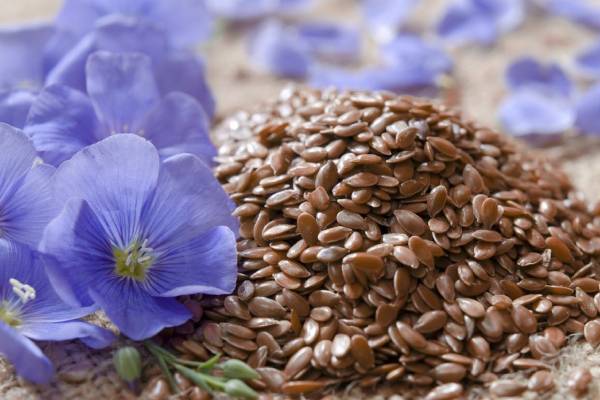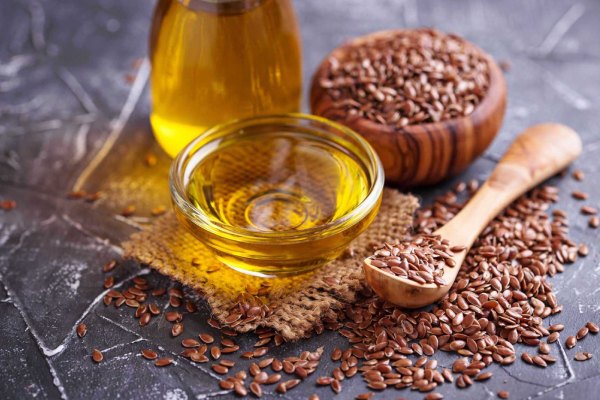Flax has always been highly valued for its medicinal properties.  Its Latin name translates as “most useful.” Hippocrates is considered the discoverer of the medicinal properties of flax seeds. Avicenna and Dioscorides also mentioned the healing properties of flax. Currently, in Germany, more than 60 thousand tons of flax seed are used in the baking industry annually (on average, about 1 kg per person per year). And in Canada, flax seed is no longer considered as a food additive, but as a separate food product, and therefore a special national program has even been adopted, recommending the inclusion of up to 12% of flax seeds in baked goods. Composition of flax 100 g of flax seeds contains about 450 kcal, 41 g of fat, 28 g of carbohydrates and 20 g of protein. Polyunsaturated fatty acids Flaxseed contains three types of valuable polyunsaturated fatty acids: omega-3, omega-6 and omega-9, the correct balance of which is necessary for the normal functioning of all vital processes of the human body. And in terms of omega-3 content, flax seeds are superior to all edible vegetable oils. Only yellow flax seeds contain very few omega-3 fatty acids. Omega-3 polyunsaturated fats help lower blood cholesterol and blood pressure. Therefore, flax seeds are used for the prevention and treatment of atherosclerosis, stroke, heart attack, thrombosis and other disorders of the cardiovascular system. Omega-3 fats also reduce the risk of hormone-dependent cancers.
Its Latin name translates as “most useful.” Hippocrates is considered the discoverer of the medicinal properties of flax seeds. Avicenna and Dioscorides also mentioned the healing properties of flax. Currently, in Germany, more than 60 thousand tons of flax seed are used in the baking industry annually (on average, about 1 kg per person per year). And in Canada, flax seed is no longer considered as a food additive, but as a separate food product, and therefore a special national program has even been adopted, recommending the inclusion of up to 12% of flax seeds in baked goods. Composition of flax 100 g of flax seeds contains about 450 kcal, 41 g of fat, 28 g of carbohydrates and 20 g of protein. Polyunsaturated fatty acids Flaxseed contains three types of valuable polyunsaturated fatty acids: omega-3, omega-6 and omega-9, the correct balance of which is necessary for the normal functioning of all vital processes of the human body. And in terms of omega-3 content, flax seeds are superior to all edible vegetable oils. Only yellow flax seeds contain very few omega-3 fatty acids. Omega-3 polyunsaturated fats help lower blood cholesterol and blood pressure. Therefore, flax seeds are used for the prevention and treatment of atherosclerosis, stroke, heart attack, thrombosis and other disorders of the cardiovascular system. Omega-3 fats also reduce the risk of hormone-dependent cancers.
Linseed oil is the only food product based on flax seeds on the Russian market. Only oil obtained by cold pressing is usually used for food. Flaxseed oil cannot be stored for a long time and must be protected from exposure to light and air. You cannot fry or cook food on it. Oxidized or heated oil loses not only its taste, but also its healing properties and accumulates toxic substances. Protein The protein contained in flax seed is similar in amino acid composition to the composition of plant proteins in soybeans.
- Fiber Flax seeds are an excellent source of plant fiber. And fiber is known to help reduce the risk of cancer and have a beneficial effect on the immune system. It activates intestinal activity. Fiber, swelling in the intestines, increases the volume of intestinal contents and thus stimulates its emptying, thereby helping to cope with chronic constipation.
- Polysaccharides Due to the high content of polysaccharides, flax seeds, when immersed in water, quickly become covered with colorless mucus, which has an enveloping and bactericidal effect on the mucous membrane of the digestive tract, and is therefore indispensable in the treatment of gastritis and stomach ulcers. A decoction of flaxseed is used to treat boils, abscesses, burns, and various inflammations in the mouth and throat.
- Lignans Flax seeds contain special substances, lignans, which are antioxidants, have antibacterial and antiviral properties and, like omega-3 fats, prevent the development of cancer. Flax seeds contain 100 times more lignans than other plant foods. The most lignans are found in the flax seed coat. Flaxseed oil contains a small amount of lignans or does not contain them at all (depending on the production technology).
- Vitamins and microelements Flax seeds contain vitamins F, A, E, B. Vitamin F is actively involved in fat and cholesterol metabolism. Therefore, flax seed can also lower cholesterol levels, especially in women. Vitamins A and E have a beneficial effect on the skin - it is thanks to them that flaxseeds have found use in many cosmetic recipes.
- Flax seeds are an important source of selenium. They are also rich in lecithin. Due to their composition, flax seeds are used to treat inflammation of the respiratory system, as an emollient and expectorant for dry coughs. Flax seeds are also used for cystitis, nephritis, and bladder stones. Flax seeds, which enhance the action of insulin, are also used in the prevention and treatment of diabetes. Flax seeds are a powerful sorbent, its properties are not inferior to activated carbon, and, unlike artificial sorbents, it does not affect the destruction of body cells. This is the basis for its use in the treatment of patients with radiation sickness. Regular consumption of flax seed eases asthma attacks and helps alleviate allergic diseases, improves kidney and thyroid function, and normalizes hormonal balance in a woman’s body. Recently, losing weight with flaxseed decoction has become very popular. What attracts people to this method is, first of all, the simplicity of the recipes, the absence of negative effects on the body and such “side” effects as improved immunity, general well-being and healthier skin. How to use flax seeds Flax seeds can be added to baked goods. It is believed that one tablespoon of flax seeds and three tablespoons of water can replace one egg. Flax seeds can also be mixed with porridge, yogurt, kefir, jam, salad, or added to any other product where a nutty flavor would be appropriate. Attention! Excessive consumption of flax seeds when there is not enough water can cause intestinal obstruction. Therefore, if you use flax seeds in food, do not forget to drink them with enough water. Preparing a decoction of flax seeds Most often, decoctions or infusions are prepared from flaxseed. The broth tastes quite pleasant, but only on the first day, so it is not recommended to prepare it in reserve. There are several most common recipes for preparing a decoction of flax seeds.
Pour one tablespoon of seeds into two glasses of boiling water and let it brew (preferably in a thermos) for one night. Take 100 grams half an hour before meals 2-3 times a day.
Pour a tablespoon of seeds into one glass of boiling water and cook for 30 minutes over low heat under a closed lid, stirring occasionally. Take the same as in the first recipe.
Boil thin berry jelly and add flax seeds. During the cooling process, they will swell and form a useful mass that will satisfy the feeling of hunger and thereby play a double role.
Grind a tablespoon of seeds in a coffee grinder, pour a glass of boiling water, and let it brew. It is advisable to eat flax seeds immediately after grinding due to their rapid oxidation in air due to the high content of flaxseed oil.
There are other recipes. Which one to choose is not important. The main thing is that with any option, within a few days you will notice the beneficial effects of flax seeds on your body. Experts advise taking the decoction in courses of 10 days (drink for 10 days, take a 10-day break). The usual duration is 3-4 courses, but more is possible. You can also consume whole and unsoaked flax seeds so that their swelling occurs directly in the intestines. In this case, the dosage may be as follows: for preventive purposes, it is recommended to take at least 5 g of flax seeds per day, and for treatment purposes, take 2 tablespoons in the morning and evening (on average, no more than 50 grams per day). The course of treatment is from one to several months. Attention! Please note that when consuming flax seeds in quantities of more than 1 tablespoon per day, in some cases discomfort in the liver area is possible (due to the increased content of flaxseed oil in the seeds). It is also not recommended to take whole flax seeds if you have inflammatory processes in the stomach or intestines.

